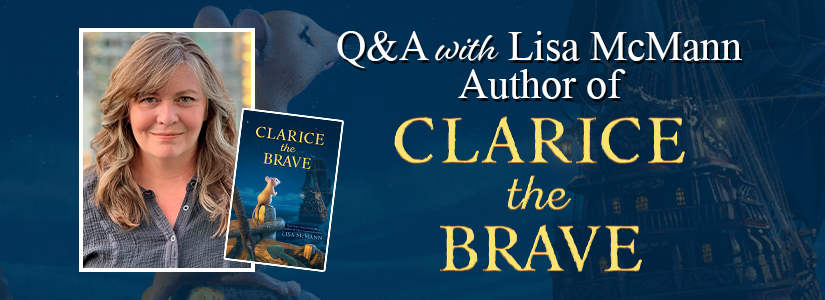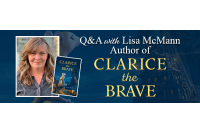Q & A with Lisa McMann, Author of Clarice the Brave


Introduction
Sometimes, when we think of bravery, we think of superheroes who can fly, read minds, or use their incredible strength to lift a car. Lisa McMann, author of Clarice the Brave and twenty-nine other novels, believes we all have the capacity to be brave in our own ways, and through her caring and mindful storytelling, she reminds readers that their actions matter:
“…We must remember that acts of bravery occur every day. There are always people who need help, and being brave can look like stretching outside your comfort zone to help someone, whether it puts you in danger or not.”
In this author interview with Lisa McMann, we’ll learn more about Lisa’s love for animals (and mutiny!), the difference between loss and absence, and how bravery, cleverness, and the will to live come in all different shapes and sizes.
Q: The main characters in your book are animals; what inspired this decision? Where does your love for animals come from?
A: My love for animals comes from my childhood; we had cats, we had dogs, we had gerbils—I absolutely loved my gerbils. I often watched shows or movies about animals and I genuinely enjoyed learning about them. I have animal characters in a lot of my books, and this just felt like the perfect chance to tell my story of a mutiny with tiny little creatures—what could be better?
When I was a teenager, I loved a book called Mutiny on the Bounty, which is a fictionalized retelling of Captain William Bligh from the 1790s. He was a terrible, mean captain of a ship, and all his sailors revolted against him and sent him overboard in a little lifeboat. They never really expected him to survive—but he did! That story has always captivated me, and one day I thought to myself, what would happen if there was a story like that, but with a couple of mice on a ship and they were the ones who got separated? What would that be like? I’m not necessarily a historical writer—I like to make things up in my head too much—but I do have a deep love for animals, and I wanted to intertwine that in my writing. I started thinking about elements of Munity on the Bounty and incorporating that into an adventure filled tale with animals and I trusted the process; I wanted to see where this would go.
Q: Both Clarice and Charles Sebastian make unexpectant friends: a cat and a human. Why is it important for us to give even the most unlikely person (or animal!) a chance at friendship?
A: We all have people we trust in life, like our friends, family members, guardians, aunts, uncles, etc., just someone we feel comfortable around, but sometimes, we find ourselves without those people. We get thrown into situations where we don’t have that person with us and we must learn how to rely on somebody else; maybe we look different from this person, or we think we won’t like this person because of whatever reason, but we’re stuck with them—and we must figure things out.
This happens a lot at school, like when kids are working with partners or in groups, and they think to themselves, “I hope I get paired with Terry, or Lucy!” and then they get paired with the person they like least in class. Things like this happen all the time, but the work still needs to get done; people must learn how to work together so they can get through this project, or get a good grade, or whatever it might be.
Sometimes, during that forced interaction, we find common ground with a person that we never expected to. I love that feeling and I do it with characters in my books quite often. In Clarice the Brave, for example, both Clarice and Charles Sebastian must find another partner to rely on other than each other. They are all alone and the one mouse they have always relied on their entire lives is gone. It’s a survival instinct for these mice—they need a partner or somebody who can help them navigate life—and they end up forming unlikely or uncommon friendships. I hope this story teaches readers to think about friendship in a different way or maybe inspires them to give someone new a chance at friendship. You never know just who you might connect with!
Q: Clarice the Brave blurs the line between the love one has for their born-into family and the love one feels towards their friends. For example, Clarice says she and Special Lady “were not just friends, but something more than that. Something deeper and more lasting, more unselfish than most friendships could ever be.” What does Clarice mean by this declaration? Is there a difference in the way we love our family members and our friends?
A: I think what Clarice is saying in this passage is that she has found someone that she puts all her trust in—unconditionally. Clarice and Special Lady have made it through a “rocky” part of their friendship, and now she is fully convinced that this cat will be here for her when she most needs it. When you feel that someone has your back for you—no matter what—and you trust them with your whole heart, that is the best feeling in the world. It makes me wonder—is that love? I tend to think so.
We all experience love in different ways; there are so many people in the world going through so many different situations, and it just proves that love can be expressed in so many unique ways. It’s different for every family, for every person—for every relationship honestly. When you find a person that you make a genuine connection with—an unbreakable connection—it’s a very special and rare occasion. That’s what Clarice is trying to voice here; she loves her mom, she loves her brother, but she shares something different with Special Lady. Special Lady risks everything for Clarice, and that is love.
Q: Clarice described Special Lady as not wanting to talk about her feelings because “feelings embarrassed her.” Why is it important that we express our feelings? What can happen if we decide that vulnerability is too arduous, that we insist on keeping our emotions bottled up inside of ourselves?
A: Special Lady is a lot like me in the sense that I often feel embarrassed about my feelings. It's something I've always struggled with—sharing my feelings— but I have realized that expressing your feelings is a form of communication, and communication is the best way to build a strong relationship. If you are going to have a great relationship with someone, being able to express your feelings is not only important, but also necessary to build a lasting bond.
If any of my readers are having a hard time expressing their feelings, I would suggest they start by finding one person they can trust—look to that special person in your life, whether it's someone at school, a family member, a neighbor, or a friend—and try having conversation. They may need to start small, like focusing on how they are feeling in the present moment and just sharing that information with another person. Over time, they may begin to share more of their feelings, like what makes them feel sad or mad, with their trusted companion. Little by little, we all become braver by sharing our feelings with others.
Q: While Benjelloun is kept captive on the lower deck of the ship, she is full of despair and recites a few lines of a poem: "I long for the moment/ in which loss turns to absence." Tell us more about the difference between loss and absence.
A: You know, loss hurts. Loss is painful. Loss is excruciating. It's missing someone so badly that you don't know what to do. Absence is the feeling that comes later, when you start to forget little details about the person you are missing, or you start to only remember the good times you once had with that person. Loss comes with tears of sadness and absence comes with a smile.
Take Benjelloun for example; she is going through a very difficult time, being trapped in her little jail cage aboard a ship on which she has no family or friends to comfort her. She is struggling to stay motivated, and at that point, she doesn’t want to feel the heaviness or the sadness that the loss of Theo is causing her. She wants to get to a moment in her life where she doesn’t feel the pain of loss, but the more bandaged version of loss: absence.
I started writing this story eight years ago, but then got a little sidetracked and wrote a few other books and series, but when I finally got back to writing this story, a lot was happening in the world. For example, there were so many kids being separated from their parents at our southern border, so many families wondering if they would ever be safely reunited. In the LEAST political way possible, I want to stress how every parent would find that just horrendous to be separated from your own children and not know if they were alive or if you would ever see them again. That feeling is what inspired me to keep writing Clarice the Brave, a book about separation and the hardships that come along with it.
I started pouring my heart out into this book and then another storm hit: the Covid 19 Pandemic. People were separated from their families, kids couldn’t see their grandparents for over a year, and my husband and I weren’t able to see our daughter for seventeen months! She was in her early twenties at the time, working in Canada, and she couldn’t cross our northern border to come home. I was devastated; I was missing my daughter and thinking about what it would be like to be a parent at our southern border whose kids were ripped away from them. All those feelings of separation went into this story, in one way or another.
This book took form when everyone in the world was going through their own struggles of loss and suffering, and that’s what really fueled Clarice the Brave. The feelings in this book are very powerful and real—and genuine. I knew everyone could relate to loss or absence in some way, no matter how old my readers are.
Q: Every character in Clarice the Brave perseveres in times of difficulty and uncertainty. Why is it important for readers to persist through difficult times in life? What advice would you offer them?
A: If there's somebody out there who reads Clarice the Brave and gets some comfort from the book—because maybe they are in a tough situation or maybe they are separated from someone they love—that would just make it all worth it.
Clarice is a character who never doubts she will find her beloved brother again, instead, she puts on a brave face and just goes for it; I want kids to practice this mindset, to just “go for it”, even when they are experiencing something difficult. We all have challenges—that’s just the truth of life—but I want to give my readers some encouragement, telling them, “Yes, you can do this!” I want my readers to feel like someone out there believes in them.
Q: Bravery, cleverness, and the will to live comes in all different shapes in sizes in Clarice the Brave. What do you think the ultimate act of bravery looks like?
A: I feel like what Special Lady did is the ultimate act of bravery; she loved Clarice so much that she was willing to risk everything—like her life—to help Clarice and her family. Special Lady acted without hesitation; she didn’t think twice, she just did it.
When I think about it, we all have moments in life like this, where we put others' needs before our own. I think about when kids see their peers getting bullied on the playground, and before they think of it, they walk over ready to help. They might be putting themselves in danger, but they are more concerned with helping someone who is in need or unable to help themselves. People like firefighters and members of the military do this all the time; they risk their lives to save others. I think this is the ultimate act of bravery: sacrifice.
Sometimes, when we are young, we think characters who fly, or have superpowers, or defy some kind of logic are the brave ones, but we must remember that acts of bravery occur every day. There are always people who need help, and being brave can look like stretching outside your comfort zone to help someone, whether it puts you in danger or not. It can be really difficult to step outside your safe space and make that attempt to help someone, and that’s what makes these acts so brave.
Q: What’s next in your writing career? Do you have any upcoming projects that you are excited about?
A: I'm working on a series right now called “The Forgotten Five”. It's about five supernatural kids who are born and raised in a deserted hideout, and then they enter civilization for the first time ever to search for their missing criminal parents and the stash they left behind. The kids have never seen the real world, they don't have electricity, and they don't know how technology works. They are all alone and must go on a dangerous adventure with just a map; book one is called Map of Flames. I’ll actually be on a book tour in February and March of 2024 to promote the series—keep an eye on my website to see if I’m coming your way!
Q:How can readers stay connected with you?
A:You can connect with me on Instagram, Facebook, Twitter… and TikTok! You can also visit my website here.
My favorite way to connect, however, is at school visits! I love going into schools and meeting kids and getting them excited about reading—I just really love that part of my job.










